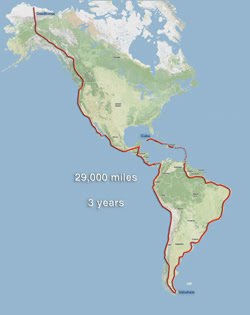Given the apparent inevitability of the earth getting warmer, at what point does it become too late to avoid the buffers? Have the horses long since since fled the barn? Is it true to say that whatever steps we take to change our behaviour, the path can never bring about the reversal of 100 years of industrial disease? So why try?
We can, maybe, alter our habits and slowly lessen the speed of the decline, but this will never be a quick process or a complete one. How many decades will pass before we start to regain the ground we've lost? Many scientists agree that an irreversible tipping point may be only 10-15 years ahead of us! Let's not kid ourselves that serious and practical consideration for our environment will become the No. 1 priority anytime soon for a society built on consumption and greed.
We can, maybe, alter our habits and slowly lessen the speed of the decline, but this will never be a quick process or a complete one. How many decades will pass before we start to regain the ground we've lost? Many scientists agree that an irreversible tipping point may be only 10-15 years ahead of us! Let's not kid ourselves that serious and practical consideration for our environment will become the No. 1 priority anytime soon for a society built on consumption and greed.
A familiar problem with our perception is referred to as 'shifting baselines' or to put it another way, people don't miss what they never had to appreciate in the first place. Every generation bases its life-view on what exists in their moment, their time. The oceans, the environment and the wildlife differ only slightly from our childhood, but the cumulative damage from generation after generation is almost beyond repair and in some cases already past fixing.
Fifty years from now, scuba divers and naturalists will still seek out what's beautiful in the oceans, and just as now, fight to save what they have. They'll spend some time trying to appreciate what's been lost for ever but will not, of course, be able to bring it back.
So do we continue to shift our baselines and move happily forward, each generation accepting what it has as the norm? . . . . Of course not. We have to round up the horses, recover what our ancestors misplaced. The responsibility of those 'in the moment' is to freeze the baselines of our generation and try to pass them down unaltered so others may have what we have. Perhaps future generations will no longer look back and lament the greed and the mistakes of the past, but instead be grateful that our generation was the first one to understand the problem and begin to apply a solution, however imperfect.
We cannot bring back extinct fauna and flora from pre-industrial days and perhaps we cannot immediately stop the temperature-raising carbon build up, but just because we cannot see the end of the line, doesn't mean that we cannot begin applying the brakes with greater urgency. We can't see precisely what outcomes will result and what real impact we can make, but even a little positive change is better than lazy indifference. Perhaps we'll see no change at all in our lifetime, but we have to look further than ourselves and do what we can regardless.
The buffers lie ahead somewhere, and we need to tie down what we have.



1 comment:
You seem to have very interesting questions.
I think you and many scientists are still debating this issue. Some believe that getting away from the use of fossil fuels will help reverse climate change, while others say it will only delay the progression. Isn't this the most frightening of issues we face as humans? More than the threat of nuclear war, the destruction of our planet freaks me out. I just don't know what to do or who has the right answer.
All we know is that the earth is warming at an alarming rate and we seem to be doing nothing about it.
Post a Comment